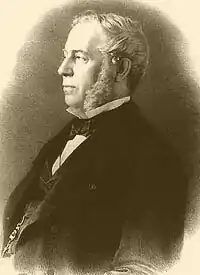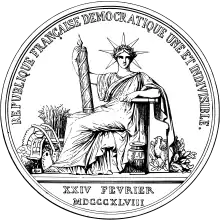Édouard Drouyn de Lhuys
Édouard Drouyn de Lhuys (pronounced [edwaːʁ dʁuɛ̃ də‿lɥis]; 19 November 1805 – 1 March 1881) was a French diplomat. Born in Paris, he was educated at the Lycée Louis-le-Grand. The scion of a wealthy and noble house, he excelled in rhetoric. He quickly became interested in politics and diplomacy.


He was ambassador to the Netherlands and Spain, and distinguished himself by his opposition to Guizot. Drouyn de Lhuys served as Minister of Foreign Affairs from 1848 to 1849 in the first government of Odilon Barrot. In Barrot's second government, he was replaced by Alexis de Tocqueville, and was appointed ambassador to Great Britain. He returned briefly as foreign minister for a few days in January 1851, and then returned permanently in the summer of 1852, becoming the first foreign minister of the Second Empire. He resigned his post in 1855, during the Crimean War, when the peace preliminaries he had agreed to in consultation with the British and Austrians at Vienna were rejected by Napoleon III.
Drouyn de Lhuys returned to power 7 years later, in 1862, when foreign minister Édouard Thouvenel resigned over differences with Napoleon on Italian affairs. Drouyn was thus foreign minister in the lead-up to the Austro-Prussian War. He commented that, "the Emperor has immense desires and limited abilities. He wants to do extraordinary things but is only capable of extravagances."[1] In the aftermath of that war, which was disastrous to French interests in Europe, Drouyn resigned and withdrew into private life.
Honours
- 1854: Knight Grand Cross in the Order of Leopold.[2]
References
- Roger Price (2001). The French Second Empire: An Anatomy of Political Power. p. 407.
- Handelsblad (Het) 25-12-1854
- Obituary. Edouard Drouyn-de-Lhuys. The New York Times, 3 March 1881. Accessed 7 October 2008
- The Illustrated London News, May 19, 1855.
Further reading
- Schnerb, Robert. "Napoleon III and the Second French Empire." Journal of Modern History 8.3 (1936): 338–355. online
- Schulz, Matthias. "A Balancing Act: Domestic Pressures and International Systemic Constraints in the Foreign Policies of the Great Powers, 1848–1851." German History 21.3 (2003): 319–346.
- Spencer, Warren Frank. Edouard Drouyn de Lhuys and the Foreign Policy of the Second Empire (PhD dissertation University of Pennsylvania, 1955).
See also
| Political offices | ||
|---|---|---|
| Preceded by Jules Bastide |
Minister of Foreign Affairs 1848–1849 |
Succeeded by Alexis de Tocqueville |
| Preceded by Vicomte de La Hitte |
Minister of Foreign Affairs 1851 |
Succeeded by Baron Brénier |
| Preceded by Marquis de Turgot |
Minister of Foreign Affairs 1852–1855 |
Succeeded by Comte Walewski |
| Preceded by Édouard Thouvenel |
Minister of Foreign Affairs 1862–1866 |
Succeeded by Marquis de La Valette |
This article incorporates text from a publication now in the public domain: Wood, James, ed. (1907). The Nuttall Encyclopædia. London and New York: Frederick Warne. Missing or empty |title= (help)



-2.svg.png.webp)